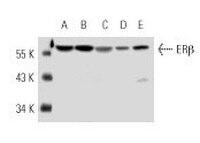PC168 Sigma-AldrichAnti-Estrogen Receptor β (Ab-1) (485-503) Rabbit pAb
This Anti-Estrogen Receptor β Rabbit pAb is validated for use in Frozen Sections, Gel Shift, WB, Paraffin Sections for the detection of Estrogen Receptor β.
More>> This Anti-Estrogen Receptor β Rabbit pAb is validated for use in Frozen Sections, Gel Shift, WB, Paraffin Sections for the detection of Estrogen Receptor β. Less<<Synonyms: Anti-ER β
Recommended Products
Overview
| Replacement Information |
|---|
Key Specifications Table
| Species Reactivity | Host | Antibody Type |
|---|---|---|
| M, R | Rb | Polyclonal Antibody |
| Product Information | |
|---|---|
| Form | Liquid |
| Formulation | In PBS, 1 mg/ml BSA. |
| Positive control | Breast carcinoma tissue |
| Preservative | ≤0.1% sodium azide |
| Physicochemical Information |
|---|
| Dimensions |
|---|
| Materials Information |
|---|
| Toxicological Information |
|---|
| Safety Information according to GHS |
|---|
| Safety Information |
|---|
| Product Usage Statements |
|---|
| Packaging Information |
|---|
| Transport Information |
|---|
| Supplemental Information |
|---|
| Specifications |
|---|
| Global Trade Item Number | |
|---|---|
| Catalog Number | GTIN |
| PC168 | 0 |
Documentation
Anti-Estrogen Receptor β (Ab-1) (485-503) Rabbit pAb SDS
| Title |
|---|
Anti-Estrogen Receptor β (Ab-1) (485-503) Rabbit pAb Certificates of Analysis
| Title | Lot Number |
|---|---|
| PC168 |
References
| Reference overview |
|---|
| Hussien, A., et al. 1997. Proc. Natl. Acad. Sci. USA 94, 1521. Li, X., et al. 1997. Neuroendocrinology 66, 63. Pratt, W.B. and Toft, D.O. 1997. Endocrine Rev. 18, 306. Schumacher, M., et al. 1996. Dev. Neurosci. 18, 6. Toran-Allerand, C.D. 1996. Dev. Neurosci. 18, 36. Weigel, N.L. 1996. Biochem. J. 319, 657. Jones, K.J. 1994. Ann. N.Y. Acad. Sci. 743, 141. Arnold, A.P. 1990. in Hormones, Brain and Behavior in Vertebrates, ed. Balthazart, J. (Karger, Basel), pp. 82-91. |








